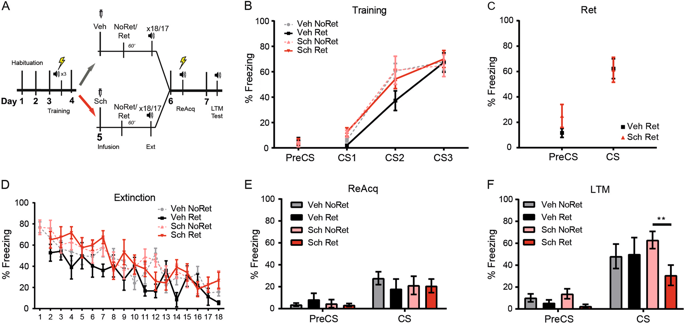当前位置:
X-MOL 学术
›
Neuropsychopharmacology
›
论文详情
Our official English website, www.x-mol.net, welcomes your feedback! (Note: you will need to create a separate account there.)
The role of prediction error and memory destabilization in extinction of cued-fear within the reconsolidation window.
Neuropsychopharmacology ( IF 7.6 ) Pub Date : 2018-12-20 , DOI: 10.1038/s41386-018-0299-y Emma N Cahill 1, 2 , Melissa A Wood 2, 3 , Barry J Everitt 2, 3 , Amy L Milton 2, 3
Neuropsychopharmacology ( IF 7.6 ) Pub Date : 2018-12-20 , DOI: 10.1038/s41386-018-0299-y Emma N Cahill 1, 2 , Melissa A Wood 2, 3 , Barry J Everitt 2, 3 , Amy L Milton 2, 3
Affiliation

|
Extinction of a cued-fear memory within the reconsolidation window has been proposed to prevent fear reacquisition by reconsolidation interference. This 'retrieval-extinction' procedure has received interest for its therapeutic potential to reduce the impact of fear memories on behavior. To fully exploit its therapeutic potential, it is critical to understand the mechanisms that underlie the 'retrieval-extinction' effect. If the effect depends upon reconsolidation of the original memory, then it would be predicted that destabilization, induced by prediction error, would be critical for observing the effect. Here, the dependency of the retrieval-extinction effect on memory destabilization or prediction error was investigated in pavlovian cued-fear conditioned adult male rats. The requirement for memory destabilization, and thus reconsolidation, for the retrieval-extinction effect was subsequently investigated using region-specific pharmacological blockade of dopamine D1-receptors. Intra-basolateral amygdala antagonism of dopamine D1-receptors did not prevent the reacquisition of fear associated with the retrieval-extinction procedure. The requirement for prediction error was assessed by using a reinforced or non-reinforced memory retrieval trial before extinction, compared to a no-retrieval, extinction-only control. Both the reinforced (no prediction error) and non-reinforced retrieval sessions led to a decrease in fear reacquisition, suggesting that engagement of prediction error does not influence the occurrence of retrieval-extinction. Together, these data suggest that retrieval-extinction does not require memory destabilization, since behavioral or pharmacological interventions that prevent destabilization did not disrupt any capacity to attenuate fear.
中文翻译:

预测误差和记忆不稳定在重新巩固窗口内消除线索恐惧中的作用。
已经提出在重新巩固窗口内消除提示恐惧记忆,以防止重新巩固干扰引起的恐惧重新获得。这种“检索-灭绝”程序因其减少恐惧记忆对行为影响的治疗潜力而受到关注。为了充分发挥其治疗潜力,了解“恢复-灭绝”效应背后的机制至关重要。如果效果取决于原始记忆的重新巩固,那么可以预测,由预测误差引起的不稳定对于观察效果至关重要。在这里,在巴甫洛夫暗示恐惧条件成年雄性大鼠中研究了检索-灭绝效应对记忆不稳定或预测错误的依赖性。对内存不稳定的要求,并因此重新巩固,随后使用多巴胺 D1 受体的区域特异性药理学阻断研究了检索-灭绝效应。多巴胺 D1 受体的基底外侧杏仁核内拮抗并不能阻止与检索-灭绝过程相关的恐惧的重新获得。通过在灭绝前使用强化或非强化记忆检索试验来评估预测误差的要求,与无检索、仅灭绝对照相比。强化(无预测错误)和非强化检索会话都导致恐惧重新获得减少,这表明预测错误的参与不会影响检索灭绝的发生。总之,这些数据表明检索灭绝不需要记忆不稳定,
更新日期:2019-01-26
中文翻译:

预测误差和记忆不稳定在重新巩固窗口内消除线索恐惧中的作用。
已经提出在重新巩固窗口内消除提示恐惧记忆,以防止重新巩固干扰引起的恐惧重新获得。这种“检索-灭绝”程序因其减少恐惧记忆对行为影响的治疗潜力而受到关注。为了充分发挥其治疗潜力,了解“恢复-灭绝”效应背后的机制至关重要。如果效果取决于原始记忆的重新巩固,那么可以预测,由预测误差引起的不稳定对于观察效果至关重要。在这里,在巴甫洛夫暗示恐惧条件成年雄性大鼠中研究了检索-灭绝效应对记忆不稳定或预测错误的依赖性。对内存不稳定的要求,并因此重新巩固,随后使用多巴胺 D1 受体的区域特异性药理学阻断研究了检索-灭绝效应。多巴胺 D1 受体的基底外侧杏仁核内拮抗并不能阻止与检索-灭绝过程相关的恐惧的重新获得。通过在灭绝前使用强化或非强化记忆检索试验来评估预测误差的要求,与无检索、仅灭绝对照相比。强化(无预测错误)和非强化检索会话都导致恐惧重新获得减少,这表明预测错误的参与不会影响检索灭绝的发生。总之,这些数据表明检索灭绝不需要记忆不稳定,


























 京公网安备 11010802027423号
京公网安备 11010802027423号